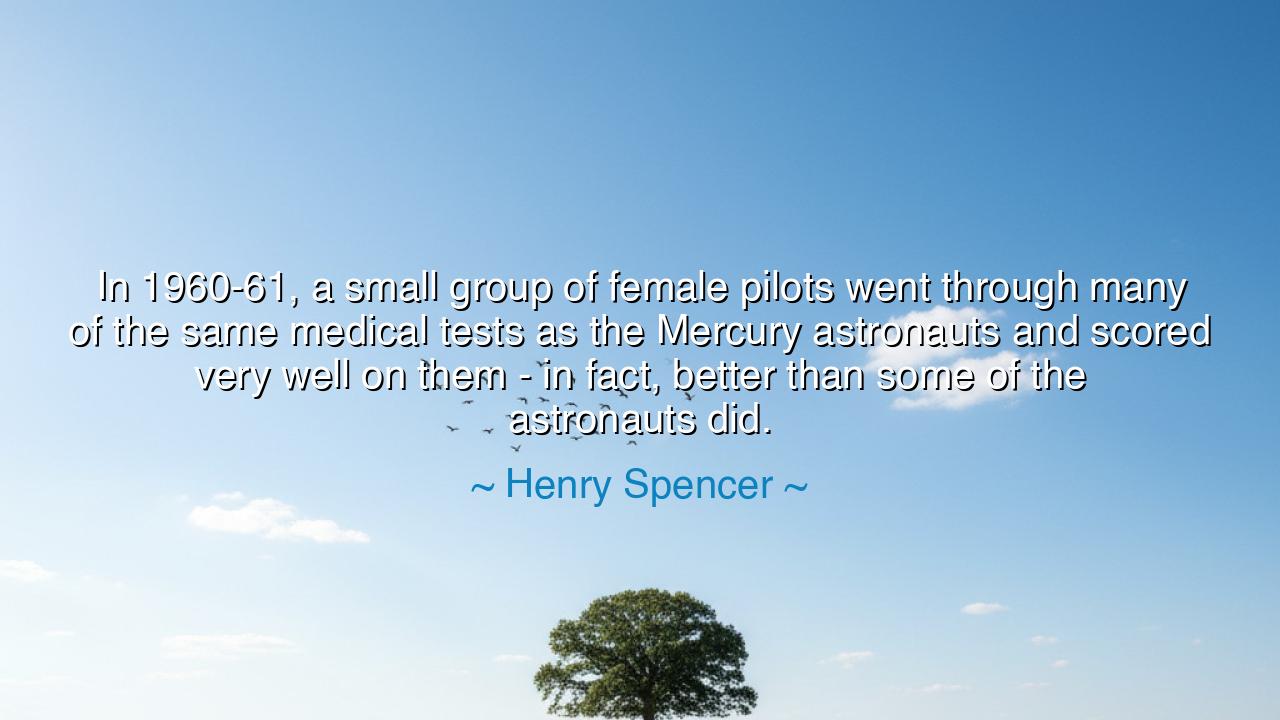
In 1960-61, a small group of female pilots went through many of
In 1960-61, a small group of female pilots went through many of the same medical tests as the Mercury astronauts and scored very well on them - in fact, better than some of the astronauts did.






When Henry Spencer declared, “In 1960-61, a small group of female pilots went through many of the same medical tests as the Mercury astronauts and scored very well on them—in fact, better than some of the astronauts did,” he was not merely recounting a forgotten chapter of history. He was unveiling a tale of hidden strength, of courage unsung, of women whose bodies and spirits proved equal to the stars, though the world would not yet let them soar. These words carry the resonance of injustice, but also the flame of inspiration, for they remind us that greatness often dwells in those whom society overlooks.
The Mercury astronauts of the early space program were chosen as the heroes of a new frontier. Their names were celebrated, their images immortalized, their courage exalted. Yet in the quiet shadows, there stood a group of female pilots, tested by the same rigorous measures, enduring trials of endurance, isolation, and physical strain. To the astonishment of many—and perhaps the dismay of some—the women’s results not only equaled, but in certain cases surpassed those of their male counterparts. This was no small feat, for these were not tests of opinion, but of body, mind, and will.
The ancients would have called such women heroines, warriors not of the battlefield but of the boundless heavens. Yet in their time, their victory was veiled, their achievement denied the recognition it deserved. Here lies the deeper meaning of Spencer’s words: the path to truth and justice is often blocked not by nature’s limits, but by man’s blindness. These women were pioneers, yet their wings were bound by the constraints of culture. Their triumph in the tests was real, yet history did not crown them.
Let us recall another such tale, that of Hypatia of Alexandria. A philosopher, mathematician, and astronomer, she shone with wisdom brighter than many of her male contemporaries. Yet the society of her time could not accept a woman as a leader of learning. Her light was extinguished not by lack of ability, but by prejudice. So too the female pilots of 1960-61: their strength was proven, yet the gates of the heavens remained closed. And yet, their story, like Hypatia’s, lives on, and from it new generations draw courage.
The lesson is clear: ability knows no gender, no boundary but the courage of the heart. When the female pilots endured those trials and excelled, they carved into history an undeniable truth—that women can endure, persevere, and triumph in realms long claimed as the domain of men. Their story is not only about spaceflight; it is about every hidden place where women’s strength has been tested and proven, only to be silenced. To remember them is to honor resilience, and to call forth justice yet unfinished.
For those who hear these words today, take this teaching to heart: do not measure greatness by who is celebrated, but by who has endured. Seek out the stories of the overlooked, for they will teach you courage greater than the tales of kings. In your own path, when doors are closed, do not let denial steal your dignity. Like the pilots who surpassed the astronauts in their tests, you may not be crowned in your time, but truth cannot be buried forever.
Practical wisdom flows from this: if you face barriers, keep preparing, keep enduring, keep testing yourself against the highest standards. The world may not yet be ready to acknowledge your strength, but history has long memory, and justice comes like dawn after a long night. Encourage others who are overlooked, lend your voice to those whose victories remain unsung, and remember that every act of resilience plants a seed for the future.
Thus, Spencer’s words call us to remembrance and to action. The story of those women is not only their story—it is ours. Let it inspire us to break barriers, to honor unseen strength, and to prepare the way for those who come after us. For in their hidden triumph lies the eternal truth: that courage and greatness belong to no single kind, but to all who dare to be tested, and who refuse to surrender.






AAdministratorAdministrator
Welcome, honored guests. Please leave a comment, we will respond soon